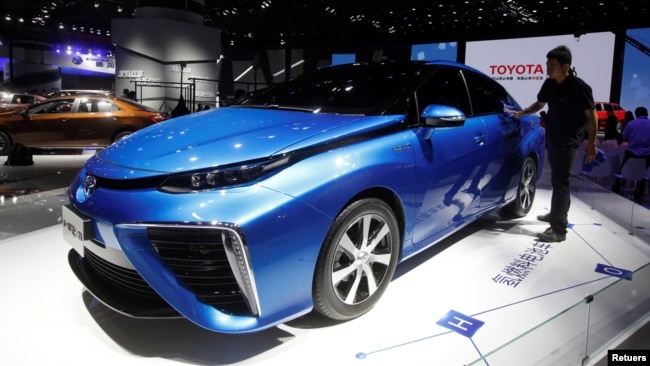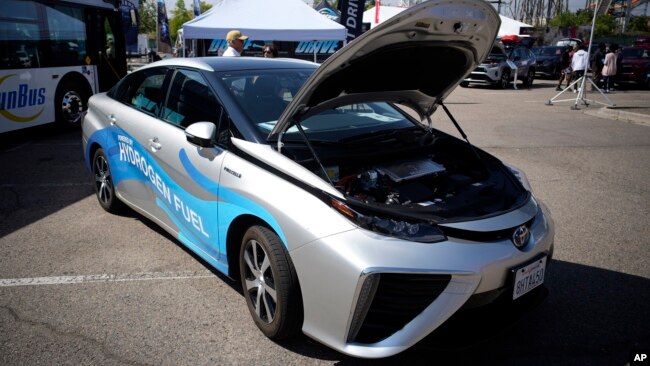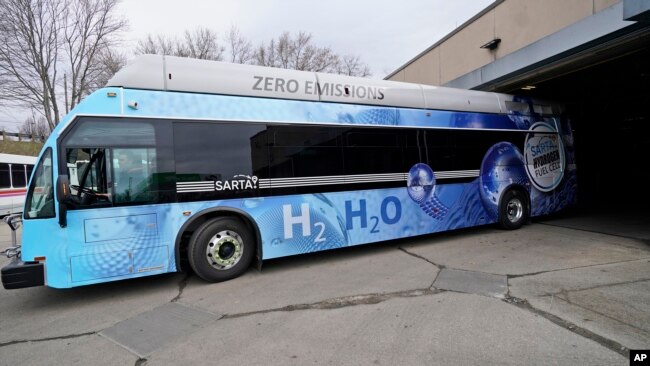Several Carmakers Push Plans to Offer Hydrogen-powered Vehicles

Several big automakers recently announced plans to keep investing in hydrogen vehicle technology. The plans come even as many industry experts believe the technology faces a major uphill battle to compete against battery-powered electric cars.
Hydrogen-powered cars are also known as fuel cell electric vehicles, or FCEVs. With these vehicles, fuel cells convert hydrogen gas into electricity. This differs from electric vehicles, or EVs, which get their power from a built-in battery.
Last month, the chief of Japan’s Toyota Motors, Akio Toyoda, attended a race that demonstrated an experimental hydrogen vehicle. The vehicle contained a traditional gasoline-powered engine that had been converted to run on hydrogen.
Toyoda told reporters at the event such conversions could keep traditional internal combustion engines running in a carbon-free world. This, he said, could avoid the need to completely leave behind internal combustion and save millions of auto industry jobs.
"The enemy is carbon, not internal combustion engines,” Toyoda said. “We shouldn't just focus on one technology but make use of the technologies we already possess."
Toyota recently launched the second-generation model of its Mirai hydrogen vehicle and has plans to offer several more models in the coming years.
In Germany, BMW and Volkswagen Group are both developing hydrogen-powered passenger vehicles along with a series of new EVs.
BMW said last month it has developed a hydrogen prototype based on its X5 model in a project partly financed by the German government. Jürgen Guldner is a vice president who heads BMW’s hydrogen car development. He told Reuters the company plans to build about 100 hydrogen test vehicles in 2022.

Officials at South Korean automaker Hyundai have also spoken about the importance of continuing to explore hydrogen-based vehicles along with developing EVs. The company currently sells a passenger fuel cell vehicle called the NEXO.
And Hyundai announced in September it plans to offer hydrogen fuel cell versions for all its commercial vehicles – such as large transport trucks and buses – by 2028.
In fuel cell technology, hydrogen combines with oxygen to produce electrical power. It is considered clean energy because the process only releases water and steam into the atmosphere. This makes the technology a good candidate for helping the world reduce its carbon emissions.
Currently, however, most of the hydrogen produced worldwide is made using natural gas or coal – both of which cause pollution.
Supporters of the technology expect that to change over time. They say the growing use of electricity from wind and solar energy will be able to separate hydrogen and oxygen in water. Those production methods, however, are more costly.
Hydrogen-powered vehicles can fuel up in minutes compared to much longer charging times required for EVs. But because the technology is so new, very few hydrogen filling stations exist.
Hydrogen fuel cell cars have a driving range of about 480 kilometers, which is much higher than most EVs. But the ranges for EVs are expected to keep getting longer as battery technology improves.

Another major difference is cost. While many EVs currently on the market are priced starting at around $30,000, most fuel cell vehicles start at about $50,000.
Currently, there are about 7,500 hydrogen fuel cell cars on the road in the U.S., most of them in California. That state has just 45 public fueling stations, but more are planned or are being built.
Industry experts say these are all reasons why hydrogen-powered passenger vehicles have a long way to go to effectively compete with EVs. In the United States, the technology is much further developed for commercial transport vehicles, such as buses and heavy trucks. Many large commercial manufacturers, including General Motors, Volvo and Daimler, have heavily invested in hydrogen to power the clean-running vehicles.
Words in This Story
battery – n. an object that provides and stores electricity for things
convert – v. to change the appearance, form or purpose of something
internal combustion – n. a heat engine in which the combustion that produces heat takes place inside the engine itself
focus – v. to give special attention to something
prototype – n. an original or first model of something from which others are copied or developed
emission – n. the act of producing or sending out something (such as energy or gas) from a source
commercial – adj. relating to buying and selling things